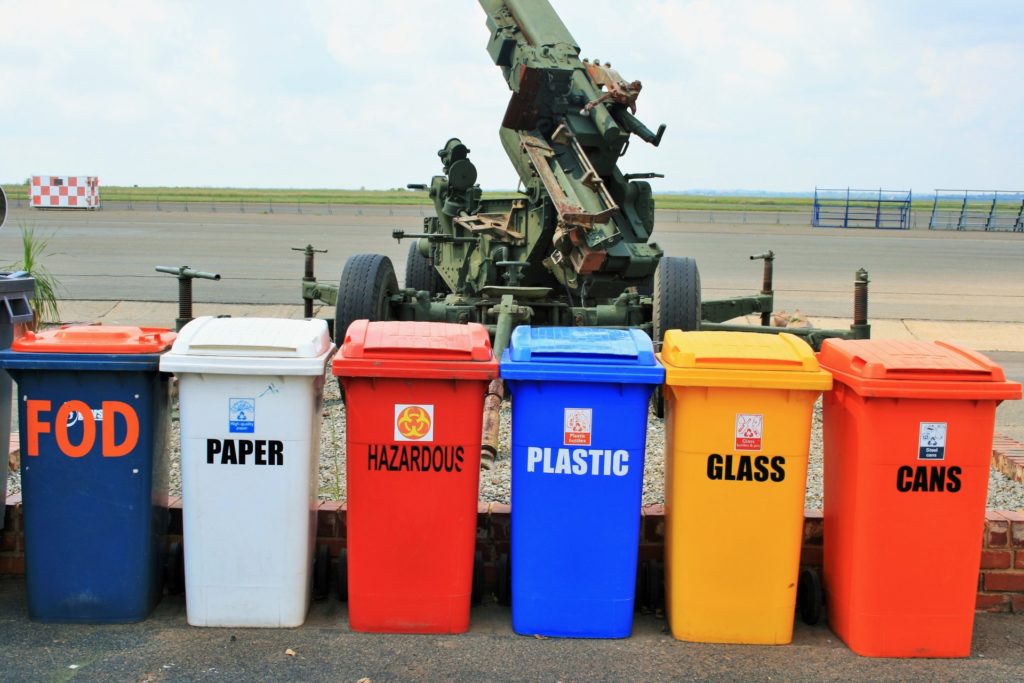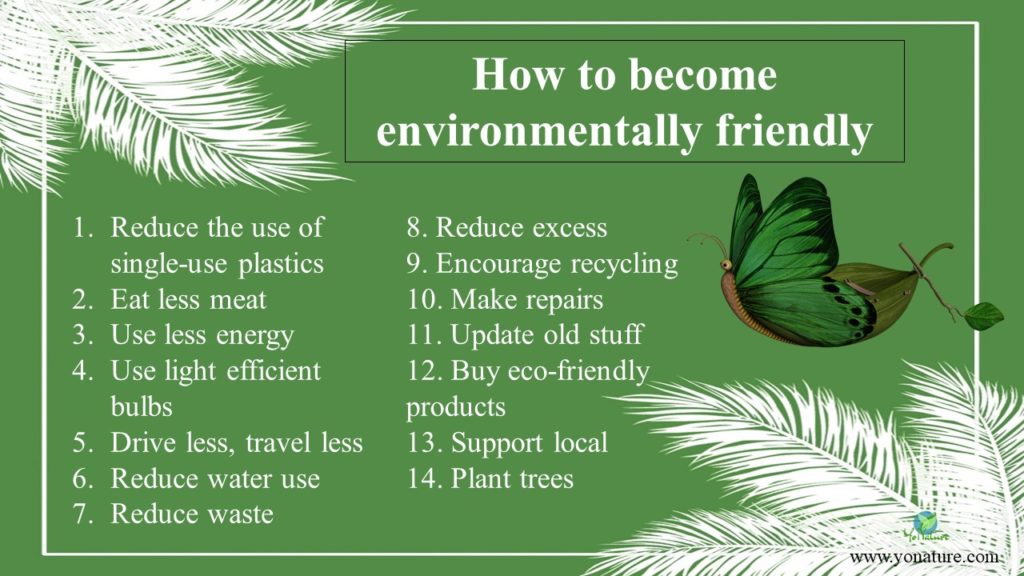14 simple ways to reduce your ecological footprint

Do you know that your daily activities have an impact on the environment?
Think of how much food goes to waste every day, how much toxic gases vehicles release and how many trees are cut down. As it is, all that we use and consume comes from our environment. Sometimes, we use more resources than the Earth can produce, or generate more waste than it can decompose.
Sustainable living
Right now, the way we are living equals 1.7 Earths! So, it is important for us to live in a more sustainable manner. Because when we apply too much pressure on the environment, it will not be able to give us what we need. Nor carry out its own functions correctly.
1. Reduce the use of single-use plastics
Single-use plastics include all those plastic items that we use only once and then throw away. Examples are plastic bags, straws, bottles and vessels. Besides causing choking hazards, they also release toxic particles during their long decomposition phase. The materials can make their way into our food chain and lead to cancer, infertility and birth defects to name a few.
Alternatives for single-use plastics
Whenever it is possible, try to avoid the use of single-use plastics. Opt for alternatives like canvas bags for shopping and refuse plastic bags and straws when unnecessary. Also, buy fresh products wrapped in paper instead of packaged ones and use glass or metals containers and cutlery.
2. Eat less meat to decrease your ecological footprint
Globally, livestock farming has a huge environmental footprint, which goes even beyond that of all vehicular emissions combined. Cattle and poultry farms not only release methane, a potent greenhouse gas but also require vast areas of land, water and food.
Eating less meat ensures that there is less release of methane. Also, it decreases the level at which we unknowingly consume genetically modified organisms.
3. Use less energy
The biggest source of carbon dioxide emission comes from the burning of fossil fuels. It may be in the form of driving vehicles, producing electricity or running industries. Carbon dioxide is the number one gas behind global warming and climate change.
When you use less energy, there is less pollution from the burning of fossil fuels. At the same time, there is less mining and habitat destruction for fossil fuel research. And it helps cut down on your bills.
4. Use light efficient bulbs
In many countries around the world, conventional incandescent bulbs have been banned because of their energy efficiencies. These bulbs actually use and waste a lot of energy just to light up. They are also quite fragile, must be replaced frequently and work poorly when there are vibrations.
LEDs and CFLs
Many nations around the world have been able to save millions per year by switching to light efficient bulbs. Light efficient bulbs include LEDs (Light Emitting Diode) and CFLs (Compact Fluorescent Lamp). They are better for the environment in terms of efficiency, energy-saving capacity and are long-lasting thus saving money.
5. Drive less, travel less
Most of the energy (95%) required for transport comes from the fossil fuel industry. Vehicles make it easier for people to move around even over very short distances. The aviation industry alone accounts for 4.5% of human-caused global warming through the emission of greenhouse gases.
To help reduce your ecological footprint, it is best that you drive less, bike over short distances and use public transport when possible. You should also encourage carpooling and not even travel at all if it is unnecessary.
6. Reduce water use
One of the most important commodities in the world is water. Even today, water is a scarce resource in many countries like Africa. Global climate change may intensify drought periods and lower water levels in many places. Lake Mead on the Colorado River is such an example. The water level has decreased to what it previously was by more than half.
As it is, you can save water in all your daily activities from bathing to household chores. You can store rainwater for watering and car washing, repair broken taps and pipes and stop the unnecessary use and wastage of water.
7. Reduce waste
As consumers, we also produce a lot of waste, and these materials have to be handled and disposed of appropriately. The way we treat and get rid of waste also leads to environmental issues. It includes pollution, leaching, attracting rodents and insects and eventually causing diseases.
The best way to reduce your ecological footprint when it comes to waste is to buy and consume less packaged products. You can also keep and reuse leftover food, compost organic materials, recycle materials whenever possible and avoid wastage of any kind.
8. Reduce excess
One important aspect of waste management is the proper handling of trash. The waste stream itself is diverse ranging from foodstuff to glass. Most of the time, the waste is dumped into landfills. There, they will eventually decompose while more waste is added daily. Other methods include burning and recycling.
Landfills require space, open burning causes pollution while incineration facilities cannot burn all waste types and recycling is only for certain materials. When we reduce the amount of waste that we produce, we decrease the environmental stress on the planet for getting rid of it.
9. Encourage recycling
Even though the concept of recycling is well known, we actually recycle a small amount of our waste. For instance, more than 91% of plastic waste is not recycled. In this way, a large amount of our trash stays in the environment causing environmental and health hazards.
Recycling diminishes the load of waste going into landfills, decreases resource use and energy to produce new materials. At the same time, it also protects habitats and wildlife.

10. Make repairs
There was a time when people would keep and use things until they were unusable in any form. Nowadays, people throw away their stuff just because of a tear or some dye. This action in fact has serious consequences on the environment.
Whenever it is possible, repair and fix broken materials. It decreases the global impact of production and transportation. Also, it helps to save money.
11. Update old stuff
In the same manner, instead of throwing away old things, find out what you can make out of them. With a little bit of imagination, you can create wonders and decrease your overall ecological footprint!
For instance, convert big plastic bottles into flower pots, upcycle old clothes into new ones, recover old pillow and couches with new fabric.
12. Buy eco-friendly products
When you buy products, always check if they are safe or not. Commonly used melamine tableware, for example, may cause leaching of chemicals into food when heated. This can then lead to kidney problems in humans.
Go for eco-friendly materials even though they may seem expensive at first. They will eventually prove to be economic. Choose organic farming, eco-friendly furniture, energy-saving appliances and cleaning products with green seals.
13. Support local
With technological innovation, the world is now a global mall. People shop from everywhere around the world. However, transportation and packaging require a lot of energy and also release a lot of carbon dioxide along the way.
By supporting local manufacturers and suppliers, you lower the level of pollution associated with these activities. At the same time, you can inquire about the safety and production means of local products.
14. Plant trees
Every year, we lose millions of acres of forests because of illegal logging and agriculture. Yet, we know that trees absorb the global warming gas, carbon dioxide, release oxygen, provide cool areas and shade.
Now, in the face of climate change, it is vital that we plant trees in our gardens and surroundings whenever it is possible. In the long run, they will prove beneficial in preventing floods, stabilizing the soil and providing fresher air.


Pingback: Positive effects of sea-level rise - Yo Nature
Pingback: Sustainable tourism in Mauritius - Yo Nature
Pingback: Tourism Explained: Definition, History, Types - Yo Nature
Pingback: Green insurance: Meaning, Products, Benefits - Yo Nature
Pingback: Environmental studies: Degree, Topics, Importance, Jobs - Yo Nature